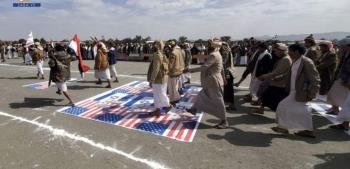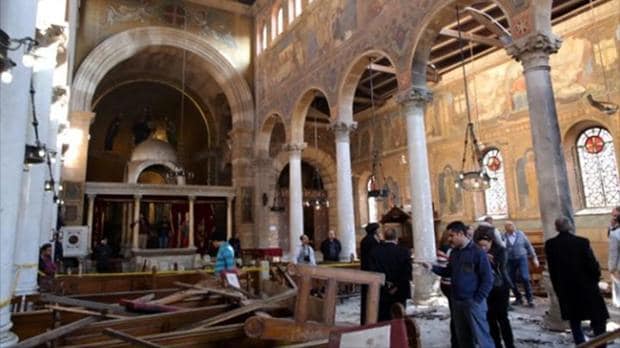Alwaght-Egyptian Coptic Christian community is mourning a deadly terrorist attack on Sunday that killed 25 people, most of them women and children.
The attack on St Peter and St Paul church, adjoining Cairo’s St Mark’s Cathedral, occurred while worshipers were attending prayers in Abbasiya neighborhood. President Abdel Fattah El-Sisi said Monday that a 22-year-old suicide bomber carried out the attacks inside Egypt’s main Coptic Orthodox Cathedral in Cairo. Al-Sisi spoke during a funeral organized by the state for the attack’s 25 victims at the Unknown Soldier Monument.
“The man who entered the church and blew himself up is named Mahmoud Shafiq Mohamed Mostafa. His body was found on site. He used an explosive belt,” the president said.
He added that three men and a woman were arrested in connection with the attack, while two suspects are being searched for. El Sisi pointed out that, “What happened is a strike by forces of evil who feel demotivated. But they will not be able to destroy our unity.”
Egypt's Al-Azhar University condemned the terrorist attack and underlined that targeting houses of worship and the killing of the innocents are criminal acts that violate Islamic principles.
Reasons behind the carnage on Christians
There are several objectives pursued by the perpetrators of this heinous and inhuman crime.
First, Egyptian Christians have always been wary of extremists groups especially Wahhabi fanatics allied to Saudi Arabia.
During the turbulent one-year rule of Mohammad Morsi, who was ousted by the army in June 2013, Wahhabi extremists had operated freely in confronting and antagonizing Egyptian Coptic Christians and other minorities in the country. Therefore, during Morsi’s presidency the Coptic Christians experienced one of the harshest periods of intolerance towards their community.
After the military-led ouster of Morsi which culminated in the presidency of ex-military chief Abdel Fattah El Sisi as president, the Coptic Christians who supported the coup experienced relative calm.
Therefore, Coptic Christians in Egypt are considered among the ardent supporters of President El Sisi due to his policies.
Considering the foregoing, it is quite clear that El Sisi’s opponents are bent on creating a rift between him and his supporters especially among the Christian minorities and thus ignite clashes and insecurity in the country.
Wahhabi sleeper cells
Analysts believe that there are sleeper cells of Wahhabi extremists loyal to Saudi Arabia which carried out the deadly terrorist attacks targeting Egyptian Christians.
The Saudi motivation to order the attack on pro-Sisi Christians may stem from the escalation of tensions between Cairo and Riyadh over regional issues including the crisis in Syria and also the dispute over the Red Sea Islands of Tiran and Sanafir. Egypt has also rejected Saudi demands to send troops to Yemen thus leading to the Saudis struggling in a worsening military quagmire in the unwinnable war against Yemenis.
Egypt which is also the seat of Al Azhar University, the premier institution of Sunni Islam, continues to oppose Saudi-backed Wahhabi terrorists due to the differences in the interpretation of Sunni Islam.
In late August, the head of Al Azhar University Sheikh Ahmed el-Tayeb attended an Islamic conference in the Russian Republic of Chechnya which during its final communiqué refused to include Wahhabism, the branch of Sunni Islam followed by the Saudi royals, on the list of true Sunnis. This move angered and infuriated the Saudis and thus increased tensions between Riyadh and Cairo.



























